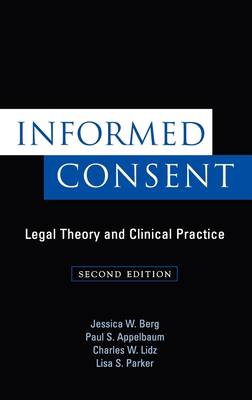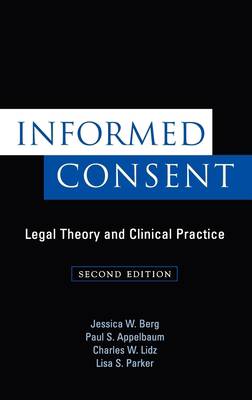
- Afhalen na 1 uur in een winkel met voorraad
- Gratis thuislevering in België vanaf € 30
- Ruim aanbod met 7 miljoen producten
- Afhalen na 1 uur in een winkel met voorraad
- Gratis thuislevering in België vanaf € 30
- Ruim aanbod met 7 miljoen producten
Zoeken
Informed Consent
Legal Theory and Clinical Practice
Jessica W Berg, Paul S Appelbaum, Charles W Lidz
Hardcover | Engels
€ 113,45
+ 226 punten
Omschrijving
Informed consent - as an ethical ideal and legal doctrine - has been the source of much concern to clinicians. Drawing on a diverse set of backgrounds and two decades of research in clinical settings, the authors - a lawyer, a physician, a social scientist, and a philosopher - help clinicians understand and cope with their legal obligations and show how the proper handling of informed consent can improve, rather than impede, patient care. Following a concise review of the ethical and legal foundations of informed consent, they provide detailed, practical suggestions for incorporating informed consent into clinical practice. This completely revised and updated edition discusses how to handle informed consent in all phases of the doctor-patient relationship, use of consent forms, patients' refusals of treatment, and consent to research. It comments on recent laws and national policy, and addresses cutting edge issues, such as fulfilling physician obligations under managed care.
This clear and succinct book contains a wealth of information that will not only help clinicians meet the legal requirements of informed consent and understand its ethical underpinnings, but also enhance their ability to deal with their patients more effectively. It will be of value to all those working in areas where issues of informed consent are likely to arise, including medicine, biomedical research, mental health care, nursing, dentistry, biomedical ethics, and law.
This clear and succinct book contains a wealth of information that will not only help clinicians meet the legal requirements of informed consent and understand its ethical underpinnings, but also enhance their ability to deal with their patients more effectively. It will be of value to all those working in areas where issues of informed consent are likely to arise, including medicine, biomedical research, mental health care, nursing, dentistry, biomedical ethics, and law.
Specificaties
Betrokkenen
- Auteur(s):
- Uitgeverij:
Inhoud
- Aantal bladzijden:
- 352
- Taal:
- Engels
Eigenschappen
- Productcode (EAN):
- 9780195126778
- Verschijningsdatum:
- 12/07/2001
- Uitvoering:
- Hardcover
- Formaat:
- Genaaid
- Afmetingen:
- 164 mm x 242 mm
- Gewicht:
- 653 g

Alleen bij Standaard Boekhandel
+ 226 punten op je klantenkaart van Standaard Boekhandel
Beoordelingen
We publiceren alleen reviews die voldoen aan de voorwaarden voor reviews. Bekijk onze voorwaarden voor reviews.











